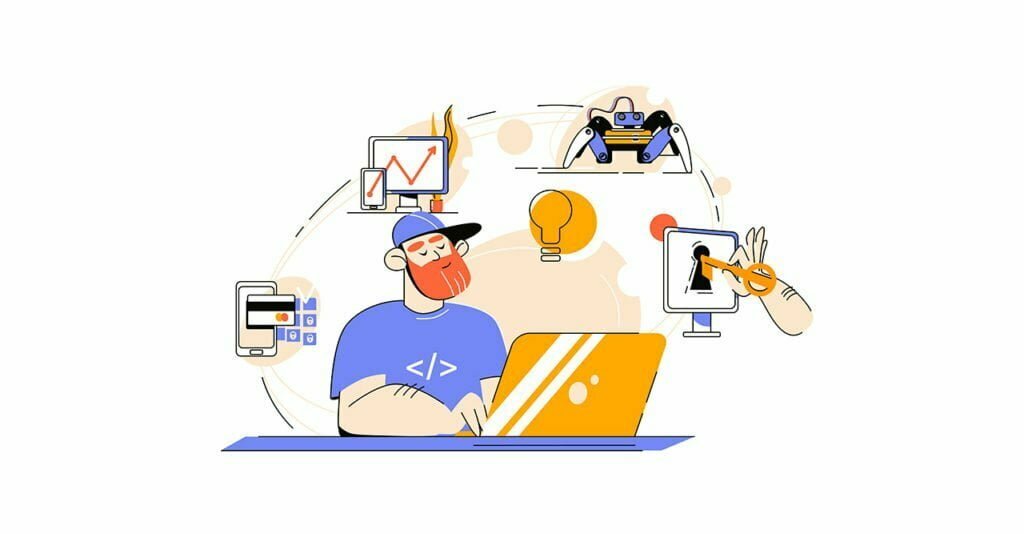Искусственный интеллект: как он изменил IT-индустрию и какие навыки нужны для работы с ним

С развитием технологий Интернета вещей (IoT), облачных вычислений и машинного обучения, Искусственный Интеллект (AI) становится все более важным для ИТ-сфере. AI может помочь компаниям автоматизировать процессы, улучшить качество продуктов и услуг, ускорить разработку, снизить расходы и повысить прибыль.
В этой статье мы рассмотрим, как AI изменил ИТ-индустрию и какие навыки нужны для работы с ним.
Что такое AI?
Artificial Intelligence (сокр. AI) или Искусственный интеллект (сокр. ИИ) – это область науки, занимающаяся разработкой компьютерных систем, которые могут выполнять задачи, обычно требующие человеческого интеллекта. ИИ включает в себя широкий спектр методов, алгоритмов и подходов, среди которых машинное обучение, нейронные сети, глубокое обучение, экспертные системы, эволюционные алгоритмы, рассуждение на основе знаний и многие другие.
Искусственный интеллект используется во многих областях жизни, таких как медицина, финансы, игры, рекомендательные системы, автоматический перевод, распознавание образов, робототехника и автономные транспортные средства. Прогресс в этой области быстро развивается и продолжает оказывать глубокое влияние на нашу повседневную жизнь.
Как AI изменил IT-индустрию
Искусственный интеллект внес правки во многие сферы жизни и бизнеса, в том числе IT, обеспечивая более точное прогнозирование, повышение эффективности и оптимизацию процессов. Ниже перечислены некоторые области, в которых AI имеет наибольшее влияние.
1. Обработка естественного языка (NLP)
AI может улучшить качество обработки, используя алгоритмы машинного обучения, чтобы распознавать и анализировать естественный язык. Это может быть полезно для разных целей, например, для автоматического отслеживания социальных медиа, обработки клиентских обращений или для создания виртуальных помощников.
2. Обнаружение аномалий
ИИ способен обнаруживать аномалии в данных, что позволяет выявлять потенциальные проблемы и улучшать качество продуктов и услуг. Примерами могут служить определение мошенничества, анализ медицинских данных для выявления заболеваний или для обнаружения аномалий в производственных процессах.
3. Автоматизация процессов
AI отлично автоматизирует процессы, что позволяет снижать затраты и ускорять производственные циклы. Например, автоматический анализ документов, оптимизация производственных цепочек или автоматизация рекламных кампаний.
4. Машинное обучение
AI может служить для обучения машин, чтобы они могли делать более точные предсказания или выполнять задачи на основе предыдущего опыта. Это может быть полезно для различных целей, например, для создания персонализированных рекомендаций, оптимизации маркетинговых стратегий или для создания умных устройств, которые могут адаптироваться к предпочтениям пользователя.
5. Интеллектуальный анализ данных (IDA)
AI может использоваться для анализа больших объемов данных, что позволяет компаниям делать более точные прогнозы и улучшать стратегические решения. Примерами могут служить анализ клиентского поведения, оптимизация ценовой политики или изучение рыночных трендов.
Навыки, необходимые для работы с AI
Работа с AI требует определенных знаний и навыков. Ниже перечислены некоторые из них.
1. Математические и статистические знания
Для работы с AI необходимо иметь понимание математических и статистических концепций, таких как линейная алгебра, теория вероятности, статистика и оптимизация. Эти знания позволяют лучше понимать алгоритмы машинного обучения и их применение.
2. Программирование
Невозможно представить работу с ИИ без знаний в программировании, таких как Python, R, Java или C++. Эти языки позволяют создавать алгоритмы машинного обучения, обрабатывать данные и реализовывать AI-системы.
3. Аналитические навыки
Также обязательны аналитические навыки, такие как умение анализировать данные и выявлять тренды. Эти знания позволяют делать более точные прогнозы и принимать эффективные решения на основе данных.
4. Понимание бизнес-процессов
Для работы с AI необходимо понимание бизнес-процессов, таких как маркетинг, производство, финансы и т.д. Это позволяет создавать AI-системы, которые могут оптимизировать процессы и улучшать бизнес-результаты.
5. Коммуникационные навыки
В конце концов, для работы в этом направлении необходимы софт-скиллы, такие как умение объяснять сложные концепции простым языком и работать в команде. Это позволяет эффективно взаимодействовать с другими специалистами и обеспечивать успешное внедрение AI-систем в организацию.
Как изучать искусственный интеллект?
Изучение искусственного интеллекта (ИИ) включает в себя изучение основ компьютерных наук, математики, статистики, а также специализированных алгоритмов и методов, используемых для создания интеллектуальных систем. Вот несколько шагов, которые помогут вам начать изучение ИИ:
- Основы программирования: Научитесь основам программирования на одном или нескольких языках, таких как Python, Java или C++. Python является особенно популярным языком для ИИ и машинного обучения.
- Математика и статистика: Изучите основы линейной алгебры, теории вероятностей, статистики и дискретной математики. Эти темы являются основой для разработки и понимания алгоритмов ИИ.
- Основы искусственного интеллекта: Ознакомьтесь с классическими методами ИИ, такими как поиск, планирование, обучение с подкреплением, логика и представление знаний.
- Машинное обучение: Изучите основы машинного обучения, такие как обучение с учителем, обучение без учителя, обучение с подкреплением и глубокое обучение. Ознакомьтесь с такими популярными алгоритмами, как линейная регрессия, k-ближайших соседей, деревья принятия решений, SVM, нейронные сети и т.д.
- Работа с библиотеками ИИ: Освойте работу с популярными библиотеками и инструментами для ИИ и машинного обучения, такими как TensorFlow, Keras, PyTorch, Scikit-learn и другими.
Многие образовательные платформы составили комплексные программы обучения, позволяющие в полном объеме получить необходимые теоретические знания и применить их на практических проектах. Вот несколько таких курсов:
- Факультет Искусственного интеллекта от GeekBrains
- Как стать специалистом по data science плюс от Яндекс Практикум
- Онлайн-магистратура Инженерия машинного обучения от SkillFactory
Эти и другие образовательные программы вы можете сравнить в каталоге курсов GeekLink.
Заключение
Искусственный Интеллект стал ключевой технологией для ИТ-индустрии, позволяя компаниям автоматизировать процессы, улучшать качество продуктов и услуг, снижать расходы и повышать прибыль. Работа с AI требует определенных знаний и навыков, таких как математические и статистические знания, программирование, аналитические навыки, понимание бизнес-процессов и софт-скиллы.
Использованные источники:
- “Artificial Intelligence in the IT Industry: What You Need to Know” by Praveen Kumar, Analytics Insight
- “Top 5 skills you need to become an AI Engineer” by Priya Dialani, Analytics India Magazine
- “The Role of Artificial Intelligence in the IT Industry” by Harnil Oza, Tech Funnel
- “5 Essential Skills for AI Professionals” by Jordan McMahon, Udacity
- “The Top 10 Skills You Need to Be an AI Engineer” by Bernard Marr, Forbes






Комментарии